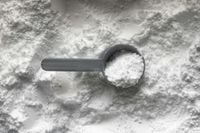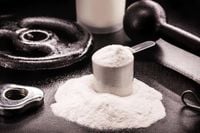The Agência Nacional de Vigilância Sanitária (Anvisa) released the results of its analysis of 41 creatine food supplements available in the Brazilian market on April 23, 2025. This evaluation involved 29 manufacturing companies and aimed to verify compliance in three key areas: creatine content, labeling accuracy, and the presence of foreign matter.
Among the products tested, only one stood out as fully compliant: the CREATINE MONOHYDRATE - 100% PURE from ATLHETICA NUTRITION, manufactured by ADS LABORATÓRIO NUTRICIONAL LTDA. This product passed all analytical tests, marking it as an exceptional example in a market often scrutinized for quality.
Interestingly, while the majority of the products, 39 to be exact, displayed creatine content within the acceptable limits set by Anvisa, they were found to have labeling inaccuracies. Only one brand was reported to have a creatine content error, which is currently under administrative review, preventing the disclosure of the brand name at this time.
Anvisa's regulations stipulate that the creatine content must not deviate more than 20% from what is declared on the nutritional label, with a reference value set at 3,000 mg. The laboratory analysis also sought to identify the presence of foreign matter in the products, and all brands successfully passed this aspect of testing.
Comparatively, the results of this analysis show improvement over those conducted between 2022 and 2024, suggesting a trend toward self-regulation within the industry. Anvisa noted that some manufacturers may have adjusted their production processes in response to earlier findings, indicating a positive shift in quality control.
However, the labeling inaccuracies identified are concerning. Of the 41 products evaluated, 40 presented some form of error or inaccuracy on their labels. Common issues included unauthorized claims about the product's properties, incomplete nutritional tables, and lack of information regarding consumption frequency and portion sizes.
According to Anvisa, these labeling inaccuracies do not pose a health risk to consumers that would necessitate further regulatory action. Nonetheless, the agency indicated that notifications may be issued to manufacturers to ensure compliance with labeling standards, which are crucial for providing accurate information to consumers.
In Brazil, food supplements are regulated under the Resolução da Diretoria Colegiada (RDC) 843/2024 and Instrução Normativa (IN) 281/2024, which require that all supplements be notified to Anvisa before being marketed. Starting September 1, 2025, all supplements already on the market must be regularized with the agency, even if they were available before the regulations took effect.
The analysis was conducted on the most popular creatine products, typically sold in 300-gram packages, which are the standard size in the market. Sample collection occurred in the second half of 2024, directly from supplement manufacturers. In the state of Rio de Janeiro, samples were also collected by the state’s Sanitary Surveillance (Visa) in retail markets, with additional sampling occurring in São Paulo, Santa Catarina, Paraná, and Espírito Santo.
Samples were collected in triplicate by local Visas to ensure reproducibility of the results, following the established protocols under Law 6.437, enacted on August 20, 1977. The analyses were carried out by the laboratory of the Instituto Nacional de Controle de Qualidade em Saúde (INCQS) at the Fundação Oswaldo Cruz (Fiocruz).
Overall, this recent evaluation by Anvisa not only highlights the importance of regulatory oversight in the supplement industry but also reflects a growing commitment among manufacturers to ensure product quality and consumer safety. As the market evolves, the expectation is that compliance with labeling and content standards will continue to improve, benefiting consumers seeking reliable nutritional supplements.
The findings from Anvisa's latest analysis serve as a reminder that while the use of creatine supplements can enhance athletic performance, consumers should remain vigilant about the products they choose. It is advisable to consult with health professionals regarding the use of such supplements to ensure they are used safely and effectively.
As the deadline for compliance approaches in September 2025, consumers and manufacturers alike will be watching closely to see how the industry adapts to these regulatory changes.






